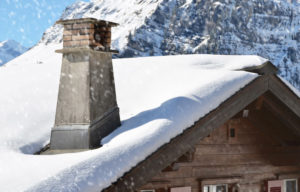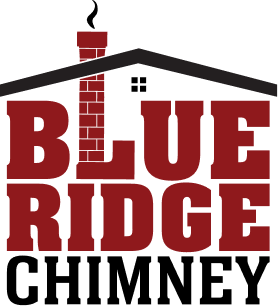Just like the famous opening lines from the song “Winter Wonderland” say, “the weather outside is frightful, but the fire is so delightful.” To many, these lyrics conjure up images of cuddling by the fireplace with loved ones while watching the snow falling peacefully through the window. While the weather  here in the Shenandoah Valley can vary greatly from winter to winter, we see about an average of 19 inches of snowfall every year. To make sure the frightful weather stays outside so that you can enjoy your delightful fire, your chimney needs to be protected against water penetration damage. For years, Blue Ridge Chimney Services has provided top-quality professional chimney maintenance, repair, and installation services to the residents of Harrisonburg and the surrounding region, and you can trust us to make sure that your chimney can stand up to the brutal winter weather every year. Our team of experienced chimney professionals has been trained and certified by the leader in our industry, the Chimney Safety Institute of America (CSIA), and we know the best preventive methods to keep water out of your chimney. We would like to tell you more about how we can make sure your fires will be delightful all winter long with our professional chimney water leak preventive services.
here in the Shenandoah Valley can vary greatly from winter to winter, we see about an average of 19 inches of snowfall every year. To make sure the frightful weather stays outside so that you can enjoy your delightful fire, your chimney needs to be protected against water penetration damage. For years, Blue Ridge Chimney Services has provided top-quality professional chimney maintenance, repair, and installation services to the residents of Harrisonburg and the surrounding region, and you can trust us to make sure that your chimney can stand up to the brutal winter weather every year. Our team of experienced chimney professionals has been trained and certified by the leader in our industry, the Chimney Safety Institute of America (CSIA), and we know the best preventive methods to keep water out of your chimney. We would like to tell you more about how we can make sure your fires will be delightful all winter long with our professional chimney water leak preventive services.
Why is water the biggest enemy of masonry chimneys?
Your exterior chimney is constantly exposed to the elements of weather, which includes water from rain and melted ice and snow. Masonry chimneys are built with a combination of masonry and metal materials, such as brick, mortar, stone, concrete, cast iron, and stainless steel, and, unfortunately, the majority of these products can suffer from adverse effects from years of direct contact with water and water penetration. When water leaks into your chimney, it can lead to rusted damper and fireplace accessories, water-stained walls and ceilings, cracked and crumbled bricks and mortar joints, and rotted adjacent wood inside your home.
What kind of damage can winter weather do to my chimney?
According to the CSIA, damaged masonry materials can deteriorate quickly during a brutally cold winter. After a big snow and ice storm, you typically will come across a pothole or two on the roads, and these potholes are a good example of what can happen to any type of masonry materials after a period of freezing temperatures. Every time it rains, the bricks and mortar joints of your chimney naturally absorb water, and any moisture that is trapped inside the masonry materials will freeze and expand whenever the temperature drops below 32 degrees Fahrenheit. As soon as the weather warms up, the water begins to thaw, and the force of its thawing can be enough to cause the bricks and mortar joints to crack and break apart. The masonry materials may even become loose and fall from the chimney structure, and if these go neglected and unrepaired, your chimney can be in serious jeopardy and at risk of a complete structural collapse. After we have experienced a snowstorm or a period of freezing weather, Blue Ridge Chimney Services always recommends to our customers to take a look at their exterior chimneys to see if any bricks or mortar joints have been damaged. If you notice any cracked, broken, loose, or missing bricks and mortar joints from your chimney, you should contact us as soon as possible to schedule a repair appointment to avoid any further masonry deterioration.
How can Blue Ridge Chimney Services help me make sure the snow stays outside this winter?
We are proud to specialize in preventing leaky chimneys with a variety of professional water penetration preventive services. After we have inspected your chimney to find any sources for water leaks and have made any necessary masonry repairs to restore the structure of your chimney, we can recommend the best water leak prevention method for your chimney and fireplace system. The CSIA gives the chimney cap the distinction of being the most economical way to keep water out of your chimney, and our CSIA-certified chimney technicians provide professional chimney cap installation services that you can depend on to protect your chimney from water leaks at its very top. Chimney caps are also essential to prevent birds, squirrels, raccoons, and other wild animals from getting inside the flue for shelter to nest. Another important chimney component that protects it in the vulnerable spot where it meets the roof, flashing consists of metal sheeting that is wrapped around your chimney in layers. Our chimney professionals will take precise measurements of this area so that the layers are customized to fit around the chimney, and we will help you choose the best metal sheeting material for your home. We also provide flashing repair services if your flashing has been damaged by a storm or from years of weather exposure.
Blue Ridge Chimney Services also provides professional chimney waterproofing services, and we strongly recommend that you consider this home maintenance investment to protect your masonry chimney from winter weather damage. After we have applied a waterproofing formula to your chimney, it will be safe from water penetration damage for at least a decade. Waterproofing is an excellent way to extend the life of your chimney. We only use waterproofing formulas that are 100 percent vapor permeable so that gases do not become trapped inside the bricks and mortar joints.
To schedule your appointment with Blue Ridge Chimney Services for any of our professional chimney water penetration preventive services, contact us today. We are always here for any of your professional chimney maintenance, repair, and installation needs.
